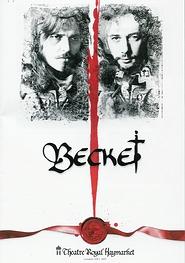Becket
French playwright Jean Anouilh lived though the Nazi occupation of France and therefore it is not surprising that the issue of race should play an important part in his historically inaccurate retelling of the story of Henry II and Thomas a Becket. In this play Becket is a Saxon who gains favour with the Norman King Henry II. However, even though race is mentioned many times throughout the play Becket was in fact as Norman as anyone else in Henry's court! The issue between Henry and Becket was one of law and power - who should govern in England, the King or the Church? It was not about race, self-identity or social justice.
Anouilh's Henry II is a man saved from the loutish influence of his court by the friendship of the Saxon, Thomas a Becket - a friend who introduces the King to culture, ideals and honour. With Becket, Henry is able to reveal his hopes and anxieties, in a world where he can trust no one - even his own mother was to eventually lead a rebellion against him - Becket was a person Henry believed he could trust. However, despite the intimate friendship that Henry craves, Becket remains detached, unable to love his king in return. It is this search for intimacy by Henry and Becket's inability to respond that lies at the heart of this drama.
Again and again Henry asks Becket "Do you love me?" only for Becket to respond with non-committal evasiveness. Each time Becket fails to respond, Henry is again fearful and alone, though his heart is broken he cannot give up the hope of being loved in return. To live with hope is bearable, without it is despair, and it is these two emotions that run throughout Jasper Britton's excellent performance as Henry II.
Whilst Britton's character wears his heart on his sleeve, Dougray Scott's Becket remains an enigma. If Henry's personality is one driven by the need for intimacy, it is impossible to understand what drives Becket's. Scott's Becket is charming and engaging and one can understand why Henry is drawn to him, but he plays the character with no angst. His Becket always knows what duty expects of him, for him choices are easy, even if life is difficult. He has no problem in understanding his own psyche; it is the psyche of others that puzzle him, whether it is the demands of a loving king or that of a powerful God. Duty becomes a cold and stern master that turns Becket from a likeable friend to a severe, uncompromising ascetic.
Jasper Britton gives a powerful and utterly convincing performance as a man whose heart is being compressed by the weight of loneliness and unrequited love. However, the power struggle that develops between Henry and Becket never amounts to much and what we are left with is a strange platonic passionate love for an enigmatic man.
Why Becket is suddenly gripped by a vocation to saintliness after being made Archbishop against his wishes is never explained, and maybe this is why Dougray Scott has such a difficult time fleshing out his character. Becket is too impulsive and unpredictable, even when he is martyred, it seems more from duty than love for God - a God whom he appears to have little respect for.
Stephen Brimson Lewis's design and Peter Mumford's lighting creates some expressive artistic scenes throughout the play. From the simple crucifix that is softly lit, to the final scene in which a posthumous naked Becket hangs like an icon of the crucified Christ, adored as ever by a kneeling Henry, the staging is beautiful. However, John Caird's production is sadly only an average affair!
Alan Bird
What other critics had to say.....
NICHOLAS DE JONGH for THE EVENING STANDARD says, "Jasper Britton... superlative performance." PAUL TAYLOR for THE INDEPENDENT says, "By no means a great play, nor a great staging. But it's a piece that ripples with unofficial energy." BENEDICT NIGHTINGALE for THE TIMES says, "laborious....despite a strong performance as Henry II from Jasper Britton, with his knobbly, grizzled face and equally arresting charisma. But this partly because of the blandness of Dougray Scott." ALASTAIR MACAULAY for THE FINANCIAL TIMES says, "John Caird, reviving the play at the Haymarket, makes it thinner, unfunnier, less plausible, yet more sexually confused than it is." MICHAEL BILLINGTON for THE GUARDIAN says, "Anouilh's characters are far less interesting than their factual counterparts."
External links to full reviews from popular press
The Guardian
The Times
The Independent
The Financial Times
Originally published on
